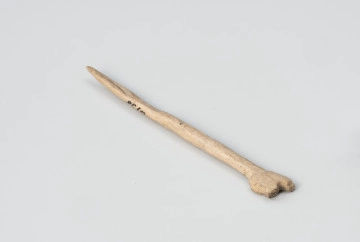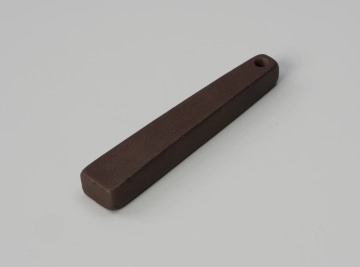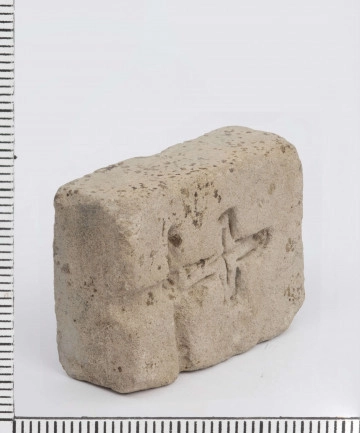
Bone pin for fastening hair or robes
800 — 1200
National Museum in Szczecin
Part of the collection: Middle Ages
Archaeological finds of casting moulds, crucibles, casting nozzles and lumps of raw material attest to the processing of non-ferrous metals. Reusable moulds made of clay or soft rock materials (sandstone, or soapstone or soapstone) were used to make serial casts of small objects, usually ornaments. For example, a stone form with a preserved unfinished temple ring is known from archaeological research in Szczecin. Ornaments with floral motifs were cast in a single mould discovered in a burial ground in Laska on the island of Wolin. The production of the desired object began with the carving of a matrix in a plate or lump of rock. The liquid metal heated in the casting crucible was transferred from above the fire with casting tongs and poured into the mould. Once solidified, the cast object had to undergo post-processing – removal of lint, casting seams, cleaning and polishing. Foundry work is one of the oldest methods of processing non-ferrous metals, known for millennia, i.e. since the Bronze Age, which began in Poland around 1700 BC. Anna Bogumiła Kowalska
Author / creator
Object type
casting mold
Technique
curving (engraving), smoothing
Material
stone
Creation time / dating
Creation / finding place
Owner
Muzeum Narodowe w Szczecinie
Identification number
Location / status

unknown
800 — 1200
National Museum in Szczecin

unknown
800 — 1200
National Museum in Szczecin

unknown
476 — 1100
National Museum in Lublin
DISCOVER this TOPIC
National Museum in Szczecin
DISCOVER this PATH
Educational path
0/500

We use cookies to make it easier for you to use our website and for statistical purposes. You can manage cookies by changing the settings of your web browser. More information in the Privacy Policy.
We use cookies to make it easier for you to use our website and for statistical purposes. You can manage cookies by changing the settings of your web browser. More information in the Privacy Policy.
Manage cookies:
This type of cookies is necessary for the website to function. You can change your browser settings to block them, but then the website will not work properly.
WYMAGANE
They are used to measure user engagement and generate statistics about the website to better understand how it is used. If you block this type of cookies, we will not be able to collect information about the use of the website and we will not be able to monitor its performance.